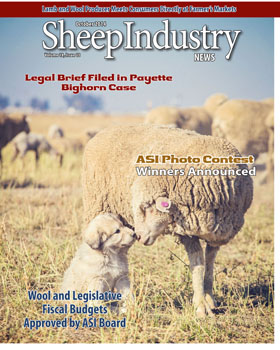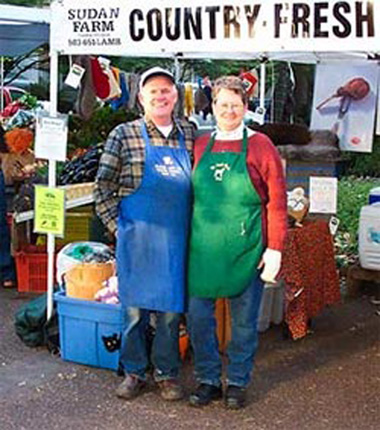
- October 2014
- President’s Notes
- ASI Team Represents Industry in Nanjing
- Belt Buckle Commemorates ASI’s 150th Anniversary
- Colorado Youngster Constructs Lego Camp in Honor of Family Heritage
- Commentary: Recent Headlines Are Example of Public’s Misunderstanding of Protection Dogs
- Dan Wilson: The Best Lamb Marketer is Usually the Person Who Raised the Lamb
- Grazing Allotments, Bighorns Take the Stage at Public Lands Council Meeting
- Market Report
- Nomination Deadline for Annual ASI Awards: Nov. 15
- Opening Brief Focused on Forest Service Payette Errors
- Sheep Budgets for 2014 Approved by Board
- Sheep News in Brief
- Working Together to Make Sheep Better
Direct Marketing
Dan Wilson: The Best Lamb Marketer is Usually the Person Who Raised the Lamb
As far as Dan Wilson is concerned, no As far as Dan Wilson is concerned, nobody on Earth can market a lamb better than the person who raised it.
“I’ve been saying it for a long time, and I also believe that if you have a producer who also knows how to cook lamb, well, then you’ve really got yourself a lamb salesman.”
Wilson and his wife, Susie, operate SuDan Farm in Canby, OR. Susie, a master spinner and knitter, direct markets all the wool and wool products produced on the couple’s farm. The couple sell about 1,200 lambs per year (as well as pastured poultry & eggs) by direct marketing them at farmer’s markets.
“These days, we sell about 70 percent of our lambs (as over 20 different cuts) directly to consumers at farmers’ markets in Oregon, and the rest go to fine restaurants in Portland, the Willamette Valley, and the Oregon coast,” Wilson said. “Actually, the chefs in those fine restaurants mostly come to us through the farmers’ markets. They taste our lamb, and they want it on their menus. It’s a great way to do business–get your lamb out there where consumers can sample it. If you know how to cook it, success will find you.”
Wilson, 73, wound up in the lamb and wool business accidentally on purpose. He grew up on a sheep ranch with about 800 ewes. He studied Agricultural Engineering at Oregon State University and earned a Masters in Farm Management.
“Growing up raising sheep, there came a point where I never wanted to see another sheep, which is probably common with many farm kids at one time or another,” he said. “But there’s always that farmer or rancher inside.”
In his 50s, Wilson was downsized and had difficulty finding a new job. He had married Susie, who was an expert knitter, spinner and sheep shearer.
“When I couldn’t find a job, I started to think about just working for myself and marketing lambs at the farmer’s market,” he said. “She would market her wool, and I would market the lamb,” which is exactly what they started to do in 2001. Dan and Susie started SuDan Farm as a second career for Dan. When Dan and Susie married in 1991, Susie brought one sheep, a burgeoning small flock shearing business, and the dream of having a farm to the relationship; everything else fell into place from there. The couple had rented some land to raise about 40 sheep for meat, wool, and breeding stock.
Susie now markets the breeding stock (Border Leicesters, Coopworths, and Gotland crosses), sells fleeces on Facebook, and has wool processed into dyed yarns, felt, rovings, batts, dyed locks, and more. “Our breeding flock of about 40 ewes is closed and Export Certified. We’ve been doing LAI with New Zealand, Australian, and UK semen since 2000 to bring in top genetics. We direct market everything that our sheep produce and have seen our wool products go into dozens of countries all over the world,” she said. Dan also believes that lamb products are a healthy and flavorful alternative to other meats. “They don’t marble like beef, but the outside fat makes the meat taste pretty darn good. Susie and I are experts at cooking lamb in many ways, and we work hard to make sure our customers have a very positive experience with enjoying our lamb. Our customers call us the Rock Stars of Lamb.”
While it does involve time and effort, Dan believes the direct marketing of lamb can be an invaluable tool for sheep producers. “You have to enjoy dealing with the public, which we do,” he said. “But the public is the key – as producers, we have to get lamb on the dinner plates of consumers and let them see how good it is.”


